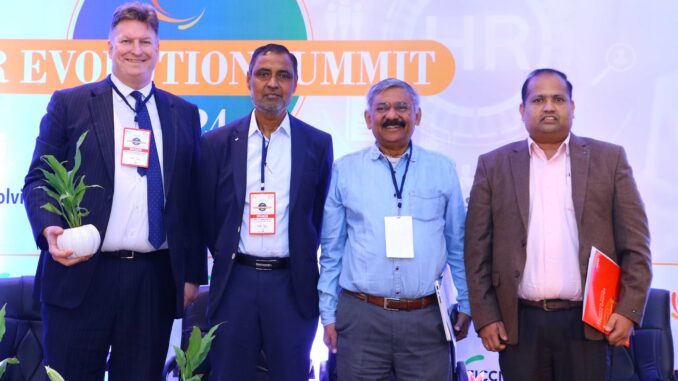NITI Ayog report predicted that the GIG workforce in India will rise from 7.7 million to 23.6 million or 6.7% of the non-farm workforce by 2029-30

Hyderabad, September 27, 2024: The Federation of Indian Chambers of Commerce & Industry (FICCI) organised a full day The HR Evolution Summit-2024 on Thursday with the theme “Adapting to Evolving Workplaces, Workforce, Work Output and Work Ethos” at the Hotel Awasa at Madhapur.
The role and face of HR are changing so much that nobody would have imagined it. Flexibility will be as important as efficiency. Performance predictability will be critical as business cycles become shorter and more volatile. Measurement and modelling are the key to predictability said T. Muralidharan, Chairman of TMI while delivering a keynote address on The Future of HR: A Revolution in the Making.
The work, workforce and workplace are changing rapidly, he said and gave five huge counter-intuitive trends in India. More women are getting educated but fewer women want to work. Male youth prefer to sit at home than work. Real wages in the organized sector are stagnant due to excess supply. Population control has happened without coercion and income inequality is growing rapidly he said
He highlighted the shifting employment terms landscape. The current generation of employees are preferring from full-time to flexible working. The days of full-time and permanent employees will be over soon, he made a startling revelation.
T. Muralidharan who is a former President of FICCI Telangana State Council said a Flexible workforce, part-time, contractual, gig and outsourced workers is going to be the norm in future. HR function needs expertise to effectively hire, engage and compensate this diverse workforce, he added.
NITI Ayog report predicted that the GIG workforce in India will rise from 7.7 million to 23.6 million or 6.7% of the non-farm workforce by 2029-30. Is HR ready for that scenario, he asked 150 plus HR professionals in the hall.
Mr. Srini Raju Chintalapati, Vice Chairman, Young India Skills University, Telangana; Founder, and Chairman of iLabs Capital gave an overview of how HR transformed. It has evolved from basic personnel management to becoming a strategic partner in achieving organizational goals. He highlighted the supply and demand gaps in employment. How entry-level workers’ salaries were staged but salaries for other roles increased manyfold. He spoke about the disparity in the wage structure. He suggested a supply chain mechanism similar to the one in manufacturing for HR.
Dr D. Srinivasa Reddy, Founder and Director, Optimus Group in his special address said HR which used to be statutory compliant has now evolved and become a strategic partner in business development.
Malcolm Nicolson, Head of Sreenidhi School said the way we work has transformed over the past few years. How do we evolve with these changing times? he asked. The answer is leadership, collaborative leadership is the need of the hour, he stated. Collaborative leadership fosters innovation, creativity and engagement and builds, confidence and trust. This leadership can help employees feel heard and understood. They are the partners in progress of each other, he added. The transition from an ego-system to an eco-system approach to leadership is a shift we are witnessing now. They form an individual-centric mindset to one that focuses on the well-being of the whole, he stressed
MVV Rama Raju, Co-chairman of FICCI Telangana State Council while welcoming the gathering said the theme of the summit ‘Adapting to evolving workplaces, work output and work ethos provides insights into the subject and engages in meaningful dialogue. The amount of technology being used in HR has transformed the way we work.
The day-long summit attended by over 150 HR professionals had two panel discussions and a workshop on Future Proofing of HR; Mental Health and Wellbeing and a workshop on Labour Code Implementation
